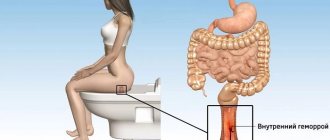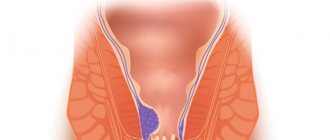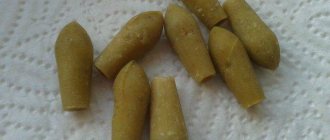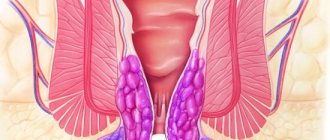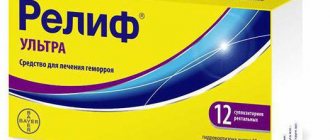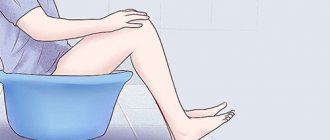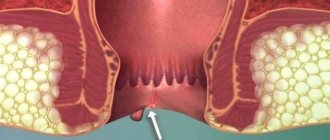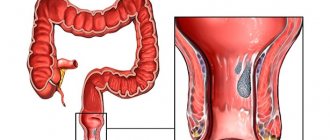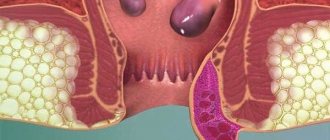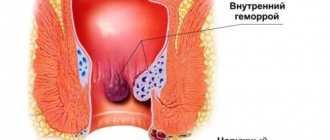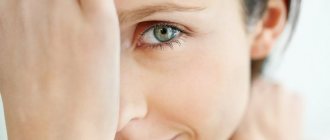Hemorrhoids are one of the most common pathologies affecting the rectum, as can be seen in the photo. According to data, about 20% of the world's population are concerned about the symptoms of such a disease; these are only those who sought medical help to receive professional treatment. It is not difficult to guess that the real number of patients is much higher, simply because of some delicacy of the problem, the majority prefer independent treatment. Exacerbation of hemorrhoids, as in the photo above, occurs against the background of an existing chronic disease and causes painful suffering to the patient.
Poor nutrition
Poor nutrition generally leads to many diseases, and not only can cause exacerbation of hemorrhoids. What is meant by “poor nutrition”? This is, first of all, eating too fatty, spicy and salty foods. All such processed food is very irritating to the rectum and anus, causing hemorrhoids to worsen. Lack of dietary fiber (fiber), that is, vegetables and fruits, is also part of poor nutrition. Their deficiency leads to constipation, and constipation leads to exacerbation of hemorrhoids, since stool during constipation becomes very hard and irritates the surface of the rectum and anus.
The essence of the process
Hemorrhoids are a disease associated with disruption of the veins in the rectal area . The cause may be age, obesity, hormonal imbalance or hereditary predisposition.
The walls of blood vessels lose their elasticity, normal blood flow is disrupted, and adhesions and blood clots occur. The next stage is the formation of painful nodes, causing constant anxiety and turning the process of defecation into real torture.
The disease can occur in acute or chronic form. In a chronic course, exacerbations of hemorrhoids alternate with periods of remission.
How long does an exacerbation of hemorrhoids last? At the initial stage, periods of rest can be quite long, but as the disease progresses they become shorter, and attacks occur more frequently.
This condition is characterized by:
fever, general weakness, irritability, insomnia;- increased intensity of pain, attacks occur both during visits to the toilet or short-term stress, and during periods of rest;
- frequent bleeding;
- severe burning and itching in the anus;
- swelling and inflammation around the anus;
- enlargement of hemorrhoids and their increased sensitivity.
Proctologists note that exacerbations in the chronic form are more severe than the primary acute stage . This is explained by a general weakening of the body, anemia due to blood loss, and the presence of infections.
Now that you know acute hemorrhoids - what it is and what a chronic type of disease is, let's move on to the next equally important topic - the reasons why hemorrhoids worsen.
Our website provides the following useful information about hemorrhoids:
- Detailed description of the various stages: first, second, third, fourth;
- Features of the internal course of the disease and external manifestations;
- A list of medications, suppositories and ointments that are used in the treatment of this disease can be found here.
There are also materials that may be of interest to you:
- Do women have a prostate?
- How does cycling affect the prostate gland?
- structure of the prostate gland.
And you can find out about harmful and beneficial products for the male organ here.
Also read about prostate diseases: adenoma, calcifications, stones, fibrosis, abscess, tuberculosis, cyst and why scars form.
Inactivity
If you move little, you risk exacerbation of hemorrhoids.
Perhaps, the main factor in the development of hemorrhoids as a disease in general, let alone its exacerbations. The fact is that with a sedentary, and especially sedentary lifestyle, blood stagnation occurs in the lower part of the body. This is a circulatory disorder leading to the formation of hemorrhoids. The cause of exacerbation of hemorrhoids affects an already existing disease even more and greatly aggravates the situation, which certainly leads not only to relapse, but also to complications.
Express therapy: how to relieve pain quickly
tablets based on lidocaine, benzocaine or prednisolone act most quickly .
At the same time, you can use pain-relieving suppositories. Suppositories with papaverine or glycerin are suitable, relaxing the intestinal walls and relieving spasms.
How to relieve hemorrhoids at home with nagging or aching pain? In this situation, cool sitz baths or lotions with herbal infusions will help.
If the discomfort is caused by irritated skin or anal fissures, use ointments and creams for hemorrhoids with menovazine and menthol. They not only relieve pain, but also cool, diverting attention from unpleasant sensations.
Now that you know how to reduce the pain of hemorrhoids at home, let's talk about the actions that will need to be taken to avoid recurrence of attacks.
https://youtu.be/X5ODBXPQ9_E
Pregnancy
Pregnancy and fetal development can worsen your hemorrhoids.
These are already the reasons for the exacerbation of hemorrhoids in women. Since during pregnancy a woman experiences a constant enlargement of the uterus, gradually the blood vessels of the small pelvis begin to be compressed, which leads to stagnation of blood. In addition, more than half of pregnant women suffer from constipation during pregnancy. It should be added that in non-pregnant women, exacerbation of hemorrhoids may occur before menstruation. This is due to excessive blood flow.
Complications
The danger during exacerbation of hemorrhoids is due to the fact that complications may arise:
- Rectal bleeding can be severe, sometimes even independent of bowel movements. This should not be allowed, as acute anemia can occur. Organs feel a lack of oxygen due to a sudden decrease in hemoglobin levels. There is a decrease in blood pressure, pale skin, and malaise.
- Paraproctitis is caused by purulent inflammation of the intestinal tissue. Infection with pathogenic organisms (E. coli, staphylococcus, etc.) is possible. A person feels increasing pain in the posterior canal, lower back, and perineum. There is an increase in temperature, chills occur due to intoxication, which, in turn, is caused by retention of urine and stool. In such situations, surgical assistance will be required.
- Colitis - if hemorrhoids worsen, the pathogenic process can spread to nearby organs, and the mucous membrane of the large intestine can also become inflamed. As a result, the gastrointestinal tract is disrupted, abdominal bloating is noted, spastic pain and flatulence occur.
To avoid complications when hemorrhoids worsen, you should immediately consult a specialist.
Symptoms of exacerbation of hemorrhoids
It all starts with simple discomfort, a feeling of something stuck in the anus, or itching or burning in the rectum, as well as pain. The patient feels particular discomfort in a sitting position. However, sometimes there are cases when everything starts immediately with bleeding or prolapse of hemorrhoids due to bowel movements. The next symptom of exacerbation of hemorrhoids is severe pain in the anus; the problem area becomes very painful and inflamed. It is painful for the patient to sit or stand, much less go to the toilet. All this is a consequence of inflammation of the hemorrhoids. If such a condition is started, then eventually rupture of the nodes, heavy bleeding, and then a purulent infection of the entire perineum may occur.
Causes of exacerbation
There are several factors that influence the condition of hemorrhoids. Any of them can provoke a sharp deterioration in health. Among the main causes of exacerbation of chronic hemorrhoids are:
- Sedentary, sedentary lifestyle.
- Poor nutrition.
- Disruption of the gastrointestinal tract.
- Increased physical activity.
- Gestation period and childbirth;
- Having bad habits.
A general weakening of the body can also aggravate the situation. It does not matter what caused it - stress, sleep disturbance, overexertion, decreased immunity or other factors.
Treatment of hemorrhoids
If you feel the first signs of exacerbation of hemorrhoids, you should immediately go to the doctor. No amount of self-medication will help with such a disease. The maximum that can be done is to provide first aid in case of relapse. For example, if the pain is too severe, you can use cold compresses (from grated potatoes or cucumbers, or gauze soaked in a cold solution of potassium permanganate), which will also disinfect the problem area. Just remember that such compresses should be applied through underwear and kept for no more than 15-20 minutes. You can also use painkillers, for example, Nise or Ketonal. Rectal suppositories can also be used - Anuzol, Gepatrombin G, Ultraproct. You should also follow basic rules in order to alleviate symptoms during exacerbation of hemorrhoids:
- Do not take a sitting position, but preferably a standing one;
- Replace bowel movements with an enema;
- Moderate your food intake and stabilize your diet.
All this will help you endure the period of exacerbation before visiting the doctor.
Symptoms of the acute period
Doctors identify a large number of factors leading to the development of this disease. Let's look at them in more detail.
- Diet violation. Eating excessively salty, hot or spicy foods leads to stimulation of blood flow to the pelvic organs.
- Lack of physical activity. Staying in one position for a long time leads to stagnation of blood in the veins of the pelvis. You can get rid of this problem with the help of physical activity.
- Digestive disorder. Bloody hemorrhoids occur with constipation or diarrhea.
- Lifting weights. During intense physical activity, the sphincter muscles become overstrained, which can lead to prolapse of the nodes.
- Pregnancy and childbirth. An increase in the size of the fetus and uterus often causes exacerbation of chronic hemorrhoids.
- Overheating of the body. Taking a hot bath entails the dilation of all blood vessels in the human body. The veins of the small pelvis are no exception. As a result of such processes, the nodes increase in size and bleed.
In addition to the above, there are also some psychological reasons that provoke acute hemorrhoids. These include frequent stress and psycho-emotional stress, which is very important for people engaged in mental work.
The most painful and at the same time debilitating sign of exacerbation is considered to be severe pain in the anal area. Sometimes the discomfort reaches such intensity that a person cannot stand or sit. The pain becomes especially unbearable during bowel movements. As a result, the patient refuses food and tries by any means to go to the toilet less often, thereby aggravating the course of the disease.
Now constipation accompanies a person constantly. Hard feces have a traumatic effect on the inflamed intestine. The patient becomes aggressive, his temperature rises and the symptoms of intoxication of the body increase.
Acute hemorrhoids are often accompanied by prolapse of nodes directly from the anus. The risk of thrombosis increases. If the nodes are pinched, their blood supply is gradually disrupted. Blood clots cause unbearable discomfort to the patient. In such cases, surgery cannot be avoided.
Sometimes, due to poor circulation, the inflamed nodes begin to ulcerate, which leads to tissue necrosis. This complication is very dangerous for human life and requires immediate surgery. When inflamed nodes rupture, heavy bleeding is often observed, which can lead to anemia.
Symptoms of the acute form of the disease occur suddenly. How can this condition be alleviated?
First of all, doctors advise taking a painkiller and applying cold to the inflamed area. To do this, you need to dissolve a small amount of potassium permanganate in ice water and soak gauze in it. Cold reduces pain discomfort, and potassium permanganate has a bactericidal effect.
If the disease worsens, it is better not to go to work, because a sitting position will only aggravate the situation. The most comfortable position for reducing the load on the anal muscles is lying down.
If you have constipation, you should not push for a long time, thereby trying to completely empty your intestines. In such situations, doctors recommend doing a cleansing enema.
You should not put off visiting a doctor for too long and do not self-medicate, because this can lead to the development of quite dangerous complications. Timely assistance from specialists can alleviate the condition and improve the patient’s well-being.
Treatment of hemorrhoids during exacerbation with folk remedies can be used as an addition to conservative treatment. Typically, such therapy is indicated in emergency cases when it is not possible to seek help from a doctor.
To stop bleeding, you can make lotions and take baths. A decoction of oak bark is usually added to the water. It has an astringent effect and promotes rapid healing of defects.
Many beekeeping products have anti-inflammatory and antibacterial effects. They are usually used in the form of local applications.
Treatment of hemorrhoids during exacerbation is also possible with the help of chamomile decoction baths. An equally popular remedy is sea buckthorn oil, which is recommended to lubricate the anus area.
What aggravates hemorrhoids is clear, now you need to understand what symptoms you need to pay attention to. The most severe and at the same time debilitating sign of the acute stage of the pathology is severe pain in the anal area. Often the discomfort is so severe that the person can neither stand nor sit.
The pain becomes especially unbearable during bowel movements. As a result, the patient is afraid to eat enough and tries in every possible way to defecate less often, thereby aggravating the course of the disease as a whole. Constipation becomes chronic. Hard feces injure the intestines, which already have a hard time with inflammation.
Exacerbation of hemorrhoids is also characterized by specific symptoms:
- Nervous disorders;
- High temperature;
- General poisoning by decomposition products.
If hemorrhoids worsen, at all stages except the first, this may be manifested by the prolapse of nodes from the anus.
When external hemorrhoids worsen, what to do? It all depends on the stage of the disease, but the problem can be radically solved only by surgical methods. When hemorrhoids become inflamed, intense bleeding may occur, which quickly leads to the development of anemia.
Many people, when hemorrhoids worsen, are interested in what can be done at home. Symptoms of exacerbation of pathology develop spontaneously. If the pain is severe, you can take a painkiller and apply a cold compress to the anus. To do this, you need to dissolve a little manganese in chilled water and moisten the bandage. Cold soothes pain and discomfort, and potassium permanganate disinfects.
If hemorrhoids worsen, what should you do on weekdays? If your work is sedentary or involves heavy lifting, you should take sick leave. The ideal body position in the acute period is bed rest.
If the patient is constipated, there is no need to push, trying to empty the intestines completely. The correct solution to the problem is a cleansing enema. You just need to do it with extreme caution. At the first symptoms of an acute period, you should make an appointment with a doctor. Treatment must be prescribed by a specialist; independent methods and experiments on yourself are fraught with complications. It is important to realize that timely medical assistance makes it possible to transfer the pathology into a state of remission.
First aid for exacerbation of hemorrhoids, which occurs with bleeding and pinching of hemorrhoids, is provided in a hospital setting. Treatment is primarily aimed at eliminating pain, for which analgesic medications are used, for example, Diclofenac, Nise.
When the inflammatory process has spread to the fiber under the skin and tissue around the inflamed node, the doctor prescribes local anti-inflammatory drugs, for example, Levomekol, Levasin. If blood clots are diagnosed on the nodes, venotonics are used - blood thinning medications, such as Heparin, Hepatrombin.
Local medications (gels, ointments) have the same qualities as suppositories. It has been proven that their use is more rational when hemorrhoids are experiencing an exacerbation. They do not injure inflamed nodes and are easily applied to painful areas of the anus. Such drugs perfectly relieve inflammation and eliminate pain, quickly heal mini-cracks and disinfect the area.
Conservative treatment of exacerbation of hemorrhoids is not always characterized by positive dynamics; in difficult situations or with the development of negative consequences, surgery may be necessary.
How to relieve exacerbation of hemorrhoids at home using folk methods? Such therapy should be carried out after consultation with a doctor, in addition to conservative treatment. Traditional methods are often used when it is impossible to urgently get to the clinic.
To stop bleeding, you can make lotions and baths. An oak decoction is prepared from the bark. It has an astringent effect and helps active healing of injured nodes. Propolis and honey have a disinfecting and anti-inflammatory effect. They are used topically, as applications.
Whatever the reasons for the exacerbation of hemorrhoids in men or women, baths of chamomile decoction can help. An equally popular medicine is sea buckthorn oil, which should be used to treat the anus. You can make rectal suppositories yourself.
Here are some simple recipes:
- You need to make a mini-candle from potatoes in the form of a cone with a rounded end on one side. The suppository is inserted into the anus twice a day. If hemorrhoids are external, use grated potatoes as a compress.
- You will need 100 g of belladonna, 0.2 kg of butter, 40 ml of propolis water suspension. You can also use solid propolis for candles.
- Prepare 20 g of propolis extract, 80 g of wax and petroleum jelly, and a little cocoa butter. All components must be melted in a water bath and poured into special forms for rectal suppositories. After the mass hardens, suppositories are inserted into the anus twice a day.
- Fat and alcohol should be taken in equal parts, add 40 g of propolis. Mix the ingredients and leave in the dark for 10 days. Then put it on the fire and simmer until the alcohol evaporates. Add fat and pour into molds.
Candles should be stored in the refrigerator. It is necessary to treat pathology in the acute stage with the help of suppositories until the negative symptoms go away. The course of treatment is 7-14 days. If necessary, the course can be repeated again.
For proctological problems, cold baths are used. They effectively eliminate the symptoms of exacerbation. For the procedure, you need to take only boiled, chilled water, approximately 18-20 oC. The procedure time is 5 minutes.
In the absence of bleeding, warm baths are also used for hemorrhoids. They are made based on:
- Manganese;
- Garlic;
- Chamomiles;
- Oak bark;
- Onion peels.
Natural ingredients will eliminate pain and reduce inflammation. Cold compresses are also effective. In order to make them, you need to take sterile gauze, a solution of a medicinal product, plastic film or oilcloth so that the base does not dry out for a long time.
Prevention of hemorrhoids
A few simple rules will help you avoid problems.
When people ask the question “how often can hemorrhoids worsen?”, it is impossible to give an exact answer. But we can say for sure that it will worsen the less often, the better the following recommendations are followed:
- To prevent hemorrhoids, it is necessary to exclude all the causes that cause it. You should eat more vegetables and fruits, drink more water, and avoid drinking alcohol. You also need to stabilize your meal times - it is advisable to eat small meals every 2-3 hours. In addition, fermented milk products will be very useful.
- Regular monitoring by a proctologist is also necessary. This should be done to avoid the development of malignant tumors of the rectum, since hemorrhoids are one of the causes of their appearance.
- Women with hemorrhoids need to pay special attention to prevention. In addition to the proctologist, also contact a gynecologist to take measures to combat this disease. Why is this necessary? In the worst case scenario, a woman will have to experience worsening hemorrhoids every month. Therefore, adequate treatment and enhanced prevention of hemorrhoids are required.
- An active lifestyle is required. Playing sports, periodically warming up at work - all this has a beneficial effect on reducing the likelihood of recurrence of hemorrhoids.
Only by following these tips can you count on long periods without exacerbations. And if it still takes you by surprise, you need to see a doctor as soon as possible.
Drug therapy
When the first signs of the disease appear, you should seek help from a doctor. Treatment of hemorrhoids during exacerbation, which is accompanied by bleeding and pinched nodes, is carried out in a hospital setting.
Drug therapy is aimed primarily at relieving pain, for which general analgesics (Diclofenac, Nise) are used. When inflammation spreads to the subcutaneous tissue and tissue around the hemorrhoid, local anti-inflammatory drugs (Levomekol, Levasin) are prescribed.
If a patient is diagnosed with hemorrhoids with blood, treatment involves the use of rectal suppositories, which contain adrenaline. This substance causes vasospasm, thereby stopping bleeding.
Local preparations (gels, ointments) have the same characteristics as suppositories. As practice shows, their use is most justified in the treatment of acute hemorrhoids. They injure inflamed nodes to a lesser extent and are easier to apply to the affected areas. Such medications have a pronounced anti-inflammatory and analgesic effect, quickly heal cracks and at the same time have a bactericidal effect.
Conservative treatment of hemorrhoids during exacerbation always has positive dynamics, but in advanced cases or if complications develop, surgical intervention may be required.
Surgical treatment and diet
How to treat acute hemorrhoids in remission? Sometimes doctors resort to surgical interventions. As a rule, disarterization is performed. This operation is performed in one session. The duration of the surgical intervention is 30-60 minutes.
This method of surgical treatment is the most effective and painless. A significant disadvantage of disarterization is its high cost (30-80 thousand rubles).
Hemorrhoids can also be treated using:
- Ligation with latex rings.
- Laser therapy.
- Sclerosis.
- Cryodestruction.
If the disease reaches grade 3-4 of severity, then a hemorrhoidectomy or Longo operation is performed. These treatment methods are more radical and therefore complex.
After stopping an exacerbation of hemorrhoids with the help of drugs or surgery, you should definitely adhere to a special diet. It provides for fractional meals. This means that a person needs to eat 5-6 times a day, but in very small portions.
It is imperative to maintain a drinking regime. Thus, a person is recommended to drink at least 2 liters of purified water daily. The following should be excluded from the diet:
- Coffee.
- Energetic drinks.
- Alcohol.
- Herbs and spices.
- Fatty foods.
- Fast food.
- Pickles.
- Canned food.
- Sweets and baked goods.
The diet should primarily consist of fiber and proteins. These nutrients are found in cereals, pasta, vegetables, fruits, low-fat dairy products, fish and meat. You should maintain a balanced diet throughout your life. Otherwise, a relapse is possible.
Dietary supplements will help protect against re-exacerbation. Such drugs are effective and completely safe. The best medicine in this segment is the Chinese patch for hemorrhoids Anti-Hemorrhoids. Doctors say that this remedy is innovative, since its use reduces the risk of re-exacerbation by an average of 80-95%.
How long does an exacerbation of proctological disease last?
The duration of exacerbation of hemorrhoids mainly depends on the individual characteristics of the person, as well as on:
- intensity of disease symptoms;
- severity of development;
- complications;
- the presence of associated diseases;
- person's age.
In addition, the duration of the course is determined by exactly when the patient consults a doctor. Often the exacerbation lasts 7 days, then the symptoms subside and remission occurs. To achieve this, comprehensive effective methods for treating hemorrhoids are used.
Remedies for hemorrhoids
When hemorrhoids take an acute form, the following symptoms are observed:
- itching in the tissues surrounding the anus;
- burning;
- bleeding;
- swelling;
- expansion of the colon.
Based on this, emergency aid facilities are divided into:
- Analgesics. They help fight pain. Novocain helps well in such situations. It establishes a blockade of sensitive receptors. Bufexamak has also proven itself well. It belongs to non-steroidal anti-inflammatory drugs. Both of these medications significantly reduce pain and inflammation. Steroid drugs, such as hydrocortisone, have an anti-inflammatory effect. It eliminates inflammation and reduces pain. Irritation from hemorrhoids recedes. Antispasmodics reduce spasms of the colon. These include, for example, belladonna. It relaxes the rectum, relieves spasms and eliminates pain.
- Hemostatic drugs. They stop bleeding from lesions in the colon. These medications include drugs that constrict blood vessels, such as phenylephrine. Acting directly on the affected area, it constricts blood vessels at the sites of its use. Reduces the abundance of blood flow. Its action is local in nature. The use of bismuth leads to an increase in fabric density. This is an astringent. It promotes the formation of a crust that blocks the flow of blood from the vessel.
- Anti-inflammatory drugs . These include steroidal and non-steroidal drugs. They reduce swelling. Antiseptics help destroy bacteria that cause inflammation.
Many ointments and suppositories are combination preparations. Consequently, their area of influence will be wider. They simultaneously relieve inflammation, pain syndromes, and stop bleeding. For example, Anuzol suppositories contain belladonna, bismuth salts, and zinc sulfate, so they can relieve pain and relieve inflammation. Suppositories and Relief ointment contain phenylephrine, which, in turn, stops bleeding, and shark liver oil stimulates tissue regeneration.
Each patient needs an individual method of treating the disease. Be careful and don’t follow the path “it helped someone and it will help me.” Each person has different symptoms of the disease. Only after a medical examination can a correct diagnosis be made and a course of treatment for the disease prescribed.
What should a patient do before seeing a doctor?
Acute hemorrhoids are definitely accompanied by severe pain, sometimes difficult to bear. What should a person do? How to relieve unpleasant symptoms before seeking medical help?
- First of all, you need to take a pain reliever. You can have a general action, for example, ketonal.
- Apply something cold to the sore spot, for example, ice cubes from the freezer, after wrapping them in a soft napkin. They will relieve swelling - as a symptom, accompanied by unpleasant sensations and terrible discomfort. If possible, make a gauze compress based on a solution of potassium permanganate, take a sitz bath made from herbs. Calendula, chamomile, and St. John's wort are suitable for herbal infusion.
- Don't stress if you are constipated. If defecation is difficult, give an enema.
- The prolapsed nodule, when it is not accompanied by bleeding and there are no necrotic crusts on the cones, put it back in, applying Levomekol ointment.
- The muscles of the anus will be under less stress if you take a lying position, preferably on your back.
When the acute phase of the disease begins
When inflammation occurs, the nodes fall out of the anal canal
Experts characterize them as cavernous formations. Such nodes regularly fill with blood. In case of circulatory disorders, vascular spasms, the blood stagnates. At the same time, the nodes enlarge, stretch, and react to every irritation with bleeding. This is hemorrhoids. It can develop and last for months or even years.
It is known that pathology in its chronic form gives several main symptoms:
- discharge of scarlet blood or slight bleeding;
- feeling of discomfort in the intestines, itching, burning in the anal area;
- enlargement of hemorrhoids (internal hemorrhoids may fall out in the second and subsequent stages of the disease).
What to do if hemorrhoids become inflamed
To figure out how and how to relieve inflammation of hemorrhoids, you should first make sure that the symptoms are actually caused by pathology of the venous nodes of the rectum. Symptoms appear with varying intensity:
- Pain is localized in the anal canal area, radiates to the tailbone, and less often to the lower abdomen. Maximum after and during defecation. Sudden ones are associated with pinched nodes, acute thrombosis, and manifest as an attack. In stages III–IV, patients feel pain when coughing or sneezing or laughing.
- Bleeding is the only sign of the disease at an early stage. It is detected by smearing discharge on toilet paper, on the surface of feces, or by a stream flowing from the anus.
- The prolapse of lumps under the skin around the anus (external nodes), into the rectal canal (internal nodes) is felt by the patient as a foreign body, a feeling of incomplete emptying.
- Wetting and fecal incontinence are characteristic of severe stages of the pathology.
- Swelling and irritation of the skin in the anus, swelling of the perineum, inguinal folds causes plasma to sweat through the vessels. Itchy rashes such as eczema and dermatitis are supported by the secretion of mucus.
- An increase in temperature is an undoubted sign of inflammation; a high temperature with sudden changes indicates the spread of infection into surrounding tissues (paraproctitis), suppuration and necrosis due to thrombosis.
- The general condition reflects intoxication; the patient tries to lie on his side, since the pain intensifies while standing and sitting. The urge to defecate is suppressed by fear of an attack.
Symptoms require immediate consultation with a doctor. In case of an acute attack of pain, you must call an ambulance. Thrombosis and strangulation cannot be treated at home.
If it is not the first time that hemorrhoids have become inflamed, patients should know what to do at the pre-medical stage. You should:
- If possible, exclude the causes of exacerbation (alcohol, physical activity).
- Change your diet - you will need to give up food for a day; it is recommended to take plenty of fluids (water, herbal decoction, green tea, dried fruit compote). If hunger is difficult to bear, then prepare liquid broth, vegetable soup, or porridge with water.
- From the second day, boiled porridge without oil (buckwheat, oatmeal), baked apples, one-day kefir, yogurt, fermented baked milk are allowed. You can add dietary fiber through bran. The diet is expanded gradually, all irritating factors, fatty and fried foods, and sweets are excluded.
- To relieve local pain, insert a rectal suppository with novocaine, anesthesin, lidocaine into the anus.
- Cool sitz baths help.
- To prevent straining, enemas are used.
